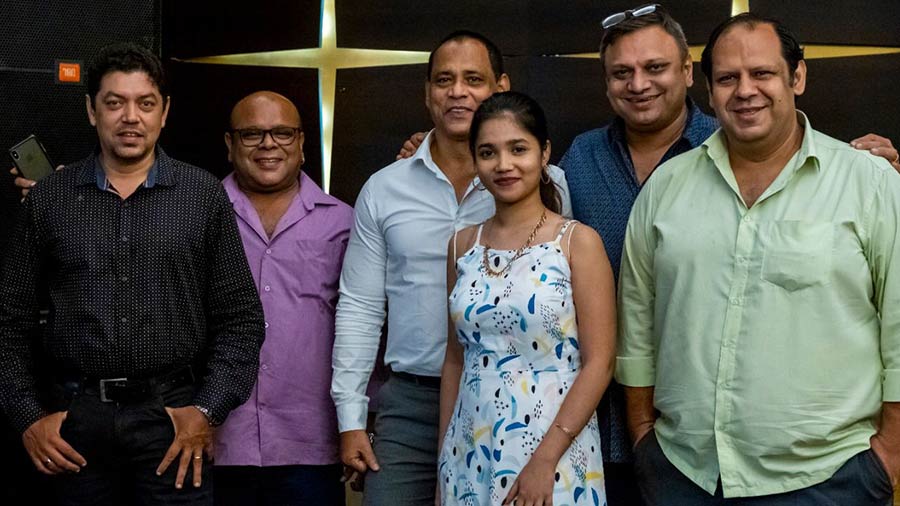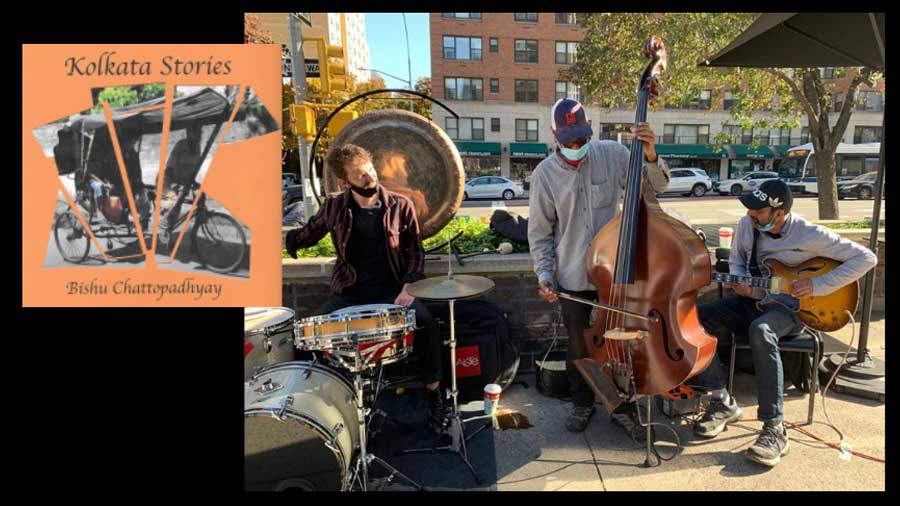In most people’s minds, the general picture of a doctor would involve formal clothing and a serious demeanour, maybe with a few medical journals on the side. What you might not expect is to see them own a stage, headbanging to rock music. A band comprising eminent surgeons and doctors from the city is breaking these notions, one concert at a time. Their name? The Osteoblasts!
The band members spoke to My Kolkata about being both medicos and musicians during one of their weekly jams.
Getting the team together
The Osteoblasts has seven members aged 29 to 65, and was initially formed by a group of orthopaedic surgeons — now senior band members — when they met at an orthopaedic conference in 2015. They had all played music in college but had been on a hiatus of 25-30 years. “We looked at the guest performer and felt we could do better,” said Ravi Bharadwaj, an orthopaedic hand surgeon with Apollo Multispeciality Hospital. This led to Bharadwaj dropping by Suhas Bala’s home with his daughter for a karaoke session. Bala, who is a paediatric orthopaedic surgeon with Apollo Gleneagles Hospital, restrung his guitar after 15 years, and that’s how it all began.
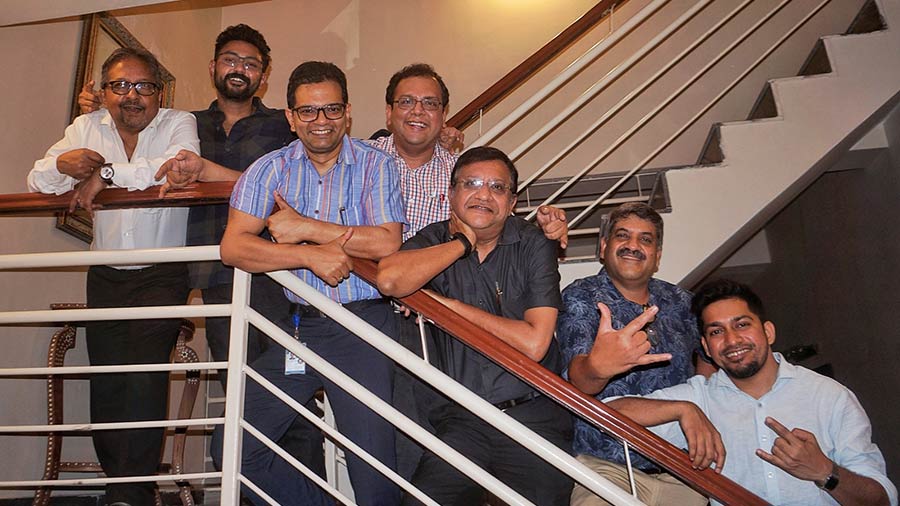
The Osteoblasts: (L-R) Doctors Suhas Bala, Subhankar Chakravorty, Abheek Kar, Rik Roy, Chandrachur Bhattacharyya, Ravi Bharadwaj and Jit Bhunia Soumyajit Dey
Bharadwaj then got in touch with a senior from Calcutta National Medical College, orthopaedic surgeon at Apollo Multispeciality Hospital, Abheek Kar. Despite not having played the guitar for years, Kar immediately agreed to join. Bharadwaj also reached out to Chandrachur Bhattacharyya, an orthopaedic surgeon with Ramakrishna Mission Seva Pratishthan and GD Hospital & Diabetes Institute, and his contemporary from Nil Ratan Sircar Medical College & Hospital. Bhattacharyya played drums in college, and joined too. The band also had Bhattacharyya’s son, Shounak, as a guitarist, Kar’s son Nikhil as a violinist, and Bharadwaj’s daughter Dhriti as a pianist.
Subhankar Chakravorty, a paediatric cancer surgeon with Tata Medical Center and Neotia Bhagirathi Woman and Child Care Centre, was the first member for whom the band waived its ‘orthopaedic-only rule’.
“Back in 2016, I was working at Apollo too. One rainy evening, I invited Dr Abheek (Kar) to jam with me at my home studio,” said Chakravorty. Following the session, Kar mentioned him to the band members and they invited Chakravorty for a jam. “Since he was not an orthopaedic surgeon, we told him, ‘You can jam with us, but won’t be a part of the band.’ But he was so good that we had to bend our rules!” said Kar. Chakravorty, who had come in thinking it was an audition, got a pleasant surprise. “Dr Bala said that since my mother was his batchmate at Calcutta Medical College, they couldn’t kick me out.”
The band’s first event was an open-air concert at the West Bengal Orthopaedic Association Annual Conference in Burdwan in 2016. It started with concerts and events among the fraternity but soon word got around, the band put up some songs on YouTube, and people took notice.
‘Music is in our bones’
The name ‘Osteoblasts’ actually refers to bone-forming cells — a name chosen in honour of their profession. The brand’s catchphrase ‘music in our bones’ summarises their philosophy. Their children who joined the band are called ‘Stem Cells’ and though they don’t get to play together often due to the kids’ school schedules, The Osteoblasts say that the Stem Cells are an integral part of the band.
With the Stem Cells not being part of the team regularly, there were fewer instrumentalists and the soundscape sounded vacant. The band wanted a dedicated vocalist, so Dr Abheek could play the guitar. Rwik (Roy, orthopaedic consultant at Howrah District Hospital) was Chakravorty’s junior at NRS, doing his orthopaedic residency at the time. “I got him to practise one day. He sang a couple of numbers and was so good that we gave up some of our own numbers for him to sing,” said Chakravorty, who was also responsible for involving Jit Bhunia, an ophthalmologist with Calcutta Medical College. “Jit is a phenomenal multi-instrumentalist and our mutual friends were colleagues. I had heard him play for a funk band, and recorded a few of his band’s tracks in my home studio,” he adds. Bhunia joined The Osteoblasts a year ago and he too has an interesting connection with another member. “My dad and Rwik’s dad were roommates in NRS, and his father delivered me!” said Bhunia.
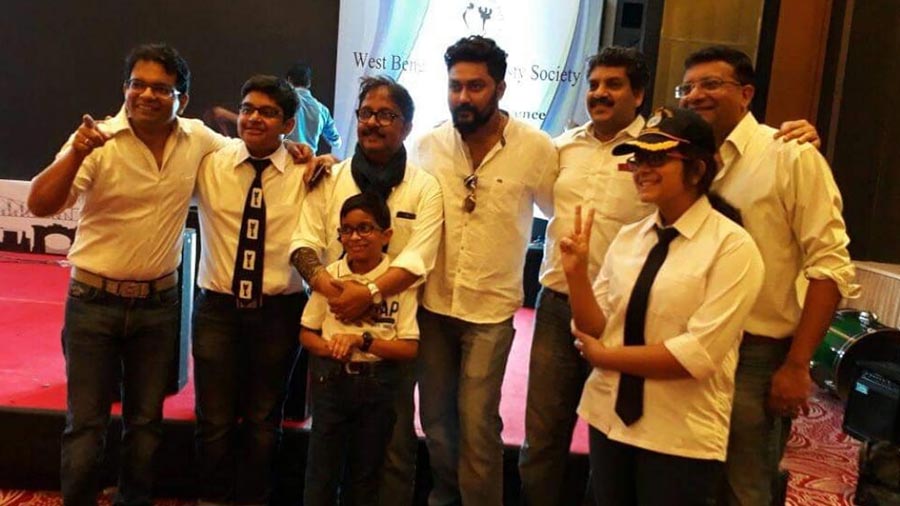
The band has an alternate wing comprising children of the doctors, who are appropriately called the ‘Stem Cells’ Courtesy The Osteoblasts
A band of diverse skills
The Osteoblasts are a diverse bunch, with everyone bringing in something special. Bala, 65, — nicknamed Jethu, because he’s ‘from The Beatles’ generation’ as Bharadwaj said — isn’t just the bassist, but also provides the lead and harmony vocals. In fact, the band dedicated a song named Jethu to him, which speaks about the devolution of society in changing times, and the need to value our seniors.
Besides playing the rhythm guitar and singing, Kar is the bond that keeps the band together by “scolding them to be on time”. Bhattacharyya, a man of many talents, plays the drums and sings, and has a soft spot for Pink Floyd. While Chakravorty sings as well, his prowess as the lead guitarist has earned him the title of the ‘crazy one’. Bharadwaj plays the keyboards, has written a few original songs, and is the unofficial band manager. All of 29, Bhunia is the youngest member, filling in any role the band needs him to. He can play the tabla, all three types of guitar (lead, rhythm and bass), drums and the keyboards. Lastly, Roy is the band’s lead vocalist and the lyricist to some of their songs.
They may be from different generations, but when they play they’re all the same, driven by passion. They were written off as this “flash in the pan” only there for a few shows, said Bharadwaj, but they’ve grown from strength to strength. “It’s nothing short of remarkable that despite being busy professionals, we’ve been jamming every Tuesday or Thursday since the last seven years. Everything else comes secondary, be it family, holidays, exams, children, or work,” he adds.
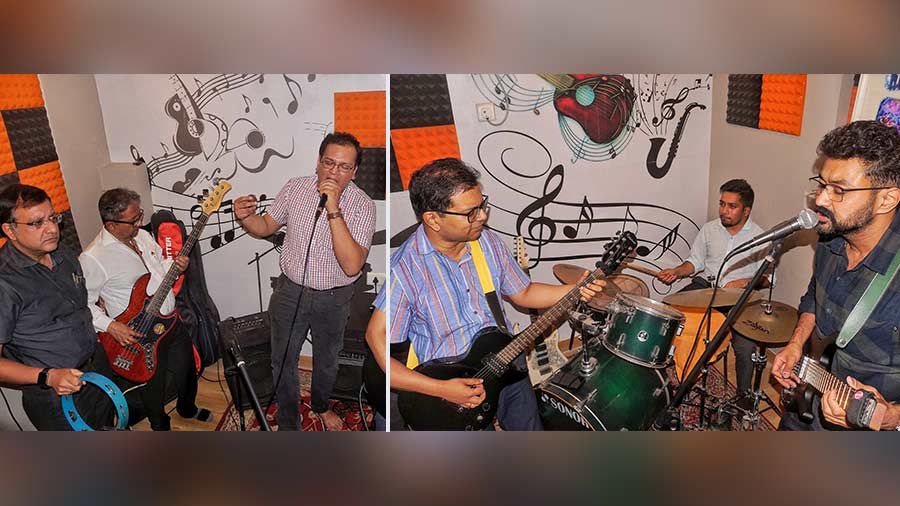
The band gets together for a jamming session at Bharadwaj’s home studio every Thursday Soumyajit Dey
Since its inception, The Osteoblasts has played at all major clubs and hotels in Kolkata, including the star hotels. The band has a vast repertoire “across five decades of music, from the ‘60s,” as Kar said. Apart from Western classics like The Beatles, Pink Floyd, Dire Straits, Eric Clapton, Bob Dylan, Nirvana and Guns N’ Roses, they also perform Hindi medleys by Mohammad Rafi, and several Bangla rock tracks like those by Fossils.
They also have original numbers, and compose with one motto: put thought into the track, and their compositions centre around people they’ve met and circumstances they’ve been in. As Chakravorty said, “Our music deals with things that people don;t think about or have taken for granted.” For example, Chakravorty’s song, 21, written during the first lockdown, might remind you of the legal age for drinking but for him it was connected to the percentage of oxygen in the atmosphere. “It has been 21 since the time of the dinosaurs, and we don’t know what would happen if it comes down to 20,” he said, speaking about the number that looks at a post-apocalyptic Earth where everything is gone, and uses this to emphasise on the need to respect what we have.
One of Bharadwaj’s original songs is about the role of a child’s grandmother in their life. Roy has also penned down a song about the life of a medical student, which deals with how people lose their early teenage and younger lives in the pressure of academics and life only begins in the 40s.
Doctor vs musician
While they are passionate musicians, their vocation often brings unexpected challenges for the band, as people often don’t see them beyond doctors. Kar reveals that a patient might question his professional aptitude if they spot him dancing in a nightclub, or enjoying a drink.
“People slot professionals into stereotypes and don’t realise that one can be good at more than one thing,” adds Bharadwaj.
Kar feels the band makes him a better surgeon. “Strumming my guitar takes away all the stress and frustration of the day. We never get applause after completing a complex surgery, but on stage we get recognition and validation.”
For this band of doctors, passion and profession each have their own important places and while there have been requests to pursue music professionally, they remain adamant about keeping it a passion. The Osteoblasts play for fun and free of charge, going as far as buying quality equipment on their own dime to give audiences a better experience. The times they are paid, it goes to charity.
Within their hospitals, the band members never advertise themselves as anything but doctors, often leading to hilarious situations with their colleagues. Kar recalls their biggest show for the Indian Orthopaedic Association in 2019 at the Biswa Bangla Convention Centre. The band played for an audience of 3,000, including some of their own students. “They were in shock and asked us, ‘Sir how are you doing this?’”
Prioritising art
While the 2019 show was a big deal, every big and small show is a unique way for the group to bond, relax and follow their passion. For this year's West Bengal Orthopaedic Association Annual Conference in Malda, the band pulled out all the stops and decided to book a tour bus for a road trip. “We drove from here with all our equipment for 10 hours, performed and returned, with plenty of beer on the way. For the entire three days, we kept our phones off, and it was incredible,” remembers Kar.
Beyond the music, what keeps The Osteoblasts together is a sense of community that they have built with each other. The doctors have a designated jamming day and three jam pads to choose from — Bharadwaj’s place, Chakravorty’s home, and Bhattacharyya’s house. These jams often climb up to three times a week in the lead-up to a show.
Aligning schedules and finding time to play music was challenging in the beginning with the doctors being in their clinics until 9pm, but schedules were adjusted over time. As a rule, on practice day, they don’t operate or work after 4pm. Chakravorty credits the senior members for the band maintaining a consistent schedule, as they went out of their way to adjust their routine to help when the younger members were new doctors with an evolving schedule. consistently maintaining this schedule for seven years.“We juniors have a continuously evolving schedule and at a vulnerable stage in our career, we can’t dictate our time. The seniors have fixed schedules, and they adapted for us.” Bhattacharyya sums it up perfectly, “That’s the effort you have to put in. It has to be a priority.”
Their passion for music means that the band continued putting out their songs online and did mini concerts from home every week to lift spirits. They even did an open-air concert on the terrace of New Town Business Club, wearing N95 masks during the gap between the first and second waves. “The mask made it very difficult to sing though,” Bharadwaj reminisces.
Communities and safe spaces
The Osteoblasts has not just given the band members fulfilment but a second family. After every show, the band goes to dinner and every practice session is complemented with a round of drinks. Their families have bonded as well, travelling together and being present for important events. Chakravorty’s daughter was born after he joined the band and the members were all there for her rice ceremony. “She is growing up in front of them and now can break instruments and shout at the top of her voice, but they still want her to be inducted as a Stem Cell,” he laughed.
The weekly sessions, much like the performances, help them unwind and shed their doctor persona like hitting a reset button. For Bhunia, the week begins on a Wednesday after the jam session and “practice is like (my) weekend.” The slate is cleared and you start afresh, without feeling irritated or agitated.” Bhunia also opens up on how joining the band felt like returning to familiarity. For some, the band reels like returning to a familiar space, bringing music back into their lives.
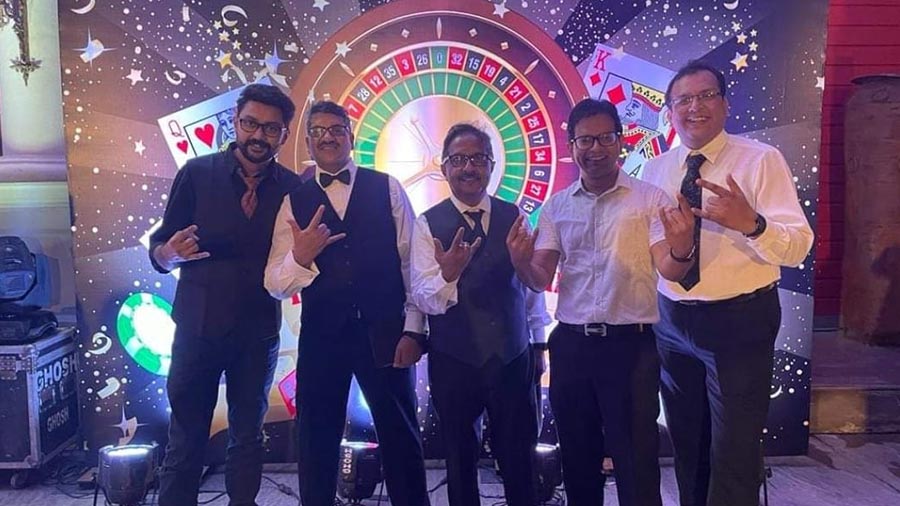
The band’s shows and sessions are also a way for the members to bond and build friendships
The sessions have also become a safe space for all of them to share happiness, sorrows and problems over music and drinks. In fact, sometimes it just involves them bonding over drinks and no one touches the instruments, said Kar.
For this band of seven doctors, following their passion for music has brought community and friendship, and a way to rejuvenate into their lives. As Kar said, “If you have a passion, don’t keep it on the backburner, because just a professional life is not enough.When you engage with any art form, it becomes liberating.”
